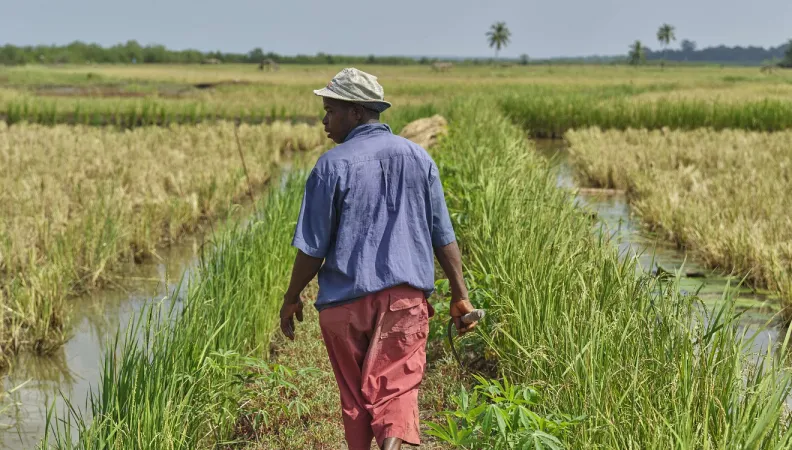Share the page
African Agriculture: Boosting Food Supply and Diversifying Diets
Published on

Development experts gathered at the International Agricultural Show in Paris to discuss the innovations and policies necessary – some of which are already underway – to help African countries improve food security. Organized by AFD at the International Agricultural Show in Paris, the conference tackled issues that will be paramount to the continent's future development.
“Africa feeds Africans” was the theme of a conference at the Paris International Agricultural Show at the end of February, sponsored by CIRAD, AFD, ECOWAS and the Network of Peasant Organizations and Producers in West Africa.
Some 20 international experts discussed issues ranging from the surge in agricultural input costs on world markets to the need for countries to build towards food sovereignty and new development models.
Despite the sharp rise in input and supply costs, African countries have reason to be buoyant about the future, said AFD CEO Rémy Rioux, noting that Africa is “on a solid foundation,” as it “imports only 16% of the food resources it needs, compared to 13% on average worldwide.”
What’s more, food production has become increasingly diversified in some countries, enabling some to be even less dependent on food imports. Nigeria, for example, “one of the countries least dependent on food imports, because its production of roots, tubers, plantains, black-eyed peas, and corn is booming,” said Nicolas Bricas, socio-economist and researcher at CIRAD.
Insufficient food diversification
Other parts of the continent, however, continue to depend on the same staples, with serious consequences for people’s health. “A lack of micronutrients found in fruits and vegetables, is becoming a major public health problem in West Africa,” said Christiane Rakotomalala, a nutritionist at the NGO GRET, in Madagascar. “Despite the availability of food, people still follow cereal-based monotrophic diets. And in urban areas, the arrival of very fatty and sweet imported products is wreaking havoc.”
“Because of insufficient food diversification,” said Bricas, “we can now see obesity appearing in places like in Bamako, Mali, where it affects 22% of the population.”
Since the 1980s, per capita food production on the continent has increased rapidly, even exceeding the FAO-recommended threshold (2,500 kilocalories per person per day) in West and Central Africa. But often, increased calorie intake gives way to nutritional quality concerns.
See also: 5 agroecology projects supported by AFD Group
Rakotomalala described the work being done by GRET and the French National Research Institute for Sustainable Development (IRD) to prevent child malnutrition. “We support small local groups in fortifying the products they make with micronutrients,” she said.
“In the central highlands, where 70% of children are malnourished, we support vegetable and grain producers. We also support the private sector. In the South, where there are problems of food insecurity due to drought, we partner with humanitarian associations to introduce millet, for example. It’s not at all a traditional Malagasy crop, but it is more resistant than sorghum. The creation of agroecological zones has also made it possible to introduce resistant crops there.”
Promoting agroecology
The benefits of agricultural diversification can be very extensive indeed. “Crop diversification in a single field can prevent diseases, because when one crop is affected, farmers don’t lose their entire harvest,” said Toutkoul Drem-Taing, Executive Secretary of Propac, on behalf of the Panafrican Farmers Organization. “Crop combination is also effective against water stress. That way, farmers can support their families and work on making their farms improve.”
Toutkoul Drem-Taing’s organization promotes agroecological principles such as reducing artificial inputs and saving water. He admits it’s difficult to implement them at the family-farm level “because of lack of support and training.”
Further research will be needed to continue to hone agricultural policies across the continent, said CIRAD CEO Élisabeth Claverie de Saint Martin. And although many solutions will come from the continent itself, the growing peril of climate change, poses unprecedented challenges, to which “Africa doesn’t always have the means to respond,” all the while with a looming population explosion, “a challenge that no continent has ever had to face.”
She stressed the key roles of research and sound public policies, not least given the twin challenges of the coming years: climate change, to which “Africa doesn’t always have the means to respond,” and the population explosion, “a challenge that no continent has ever had to face.”
